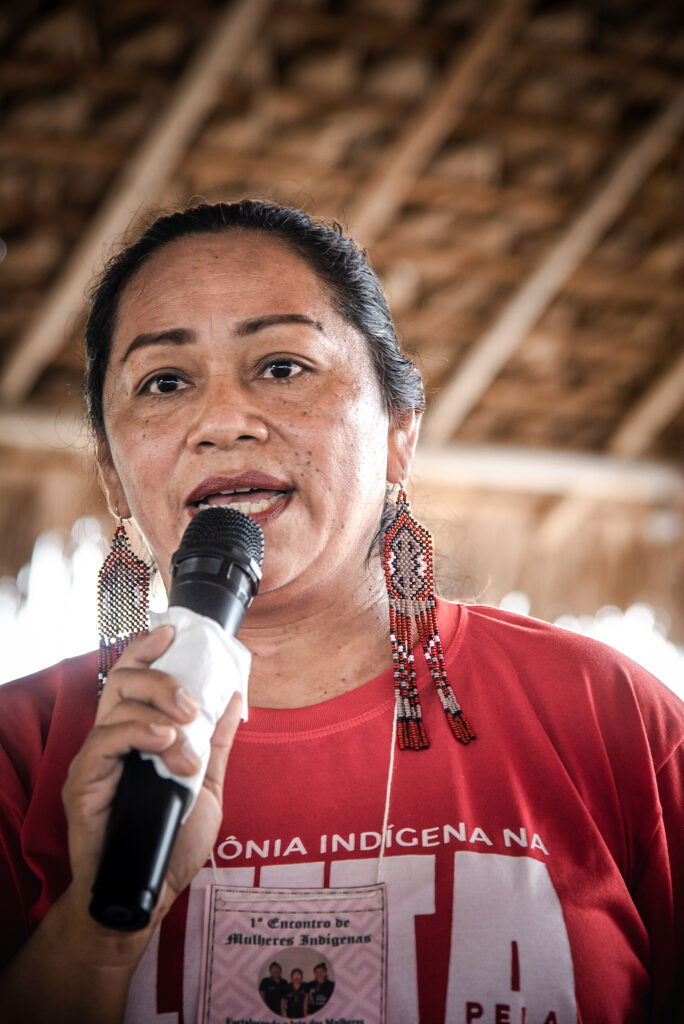
DeBriefed 4 August 2023: UK to ‘max out’ oil and gas; South America winter heatwave; How Indigenous women fight Amazon fires
Rebeca Binda
08.04.23Rebeca Binda
04.08.2023 | 2:29pmWelcome to Carbon Brief’s DeBriefed.
An essential guide to the week’s key developments relating to climate change.
This is an online version of Carbon Brief’s weekly DeBriefed email newsletter. Subscribe for free here.
This week
UK oil-and-gas licences
FOSSIL-FUEL DASH: As part of a plan to “max out” oil and gas reserves, the UK government said it will issue more than 100 new drilling licences in the North Sea, the Guardian reported. In an interview with Sky News, prime minister Rishi Sunak claimed it would be “better for the climate”, “energy security” and “jobs” to extract oil and gas in the UK rather than importing “from halfway around the world”.
‘LEADERSHIP FAILURE’: The decision to max out on new fossil fuels was met with outcry from all sectors of society. A billionaire investor threatened to pull out of the country over Sunak’s “denial” of global warming, HuffPost reported. Greenpeace activists scaled Sunak’s North Yorkshire home and draped it in black fabric in protest, BBC News reported. The UK’s largest nature organisations, which together have 20m members, threatened to start mass protests if the UK walks back on its climate commitments, the Guardian said.
FACTCHECKED: On Twitter, Carbon Brief’s deputy editor Dr Simon Evans factchecked Sunak’s “false and misleading” justifications for allowing new oil and gas expansion. Carbon Brief has previously published an in-depth analysis on why allowing new oil and gas licences flies in the face of advice from, among others, climate scientists, the UK’s statutory climate body, the International Energy Agency and the Pope.
South America’s winter heat
39C IN THE ANDES: “Unbelievable” temperatures have been registered this week in northern Chile, mid-north Argentina, Uruguay, Paraguay and Brazil – despite it being the middle of winter, said the MetSul Meteorologia, a Brazilian meteorology company. According to Chilean newspaper La Tercera, Chile is “living its little hell” as an “unusual winter heatwave” raised temperatures to almost 40C in the Andes mountains. The New York Times reported Argentina’s capital city broke an 81-year-old daily temperature record on Tuesday when temperatures reached 30C.
WATER SECURITY FEARS: According to climate scientist Dr Martin Jacques, there are fears for water security next summer as the Andes is not currently being replenished with snow, according to the Argentine newspaper La Nación. Jacques added: “In a way, this is a window into the future, we are anticipating conditions that are going to normalise.”
Around the world
- HEATSTROKE: South Korea and Japan reported heat-related deaths as extreme weather events across the countries continued, according to the Washington Post. In China, Beijing faced recorded flooding, the South China Morning Post reported.
- AFRICA SUMMIT: Kenya will try to boost conversations about climate finance at an upcoming Africa Climate Summit in Nairobi, the event’s CEO told African Business.
- COP28 PROTESTS: The United Arab Emirates (UAE) has announced that it will allow peaceful protests at the COP28 climate summit, reported Al Jazeera. Meanwhile, a list of “touchy” issues for UAE’s UN climate summit presidency was leaked to the Guardian.
- ‘RETROGRADE’ BILL: A forest conservation bill passed by India’s parliament favours “ease of doing business” over environmental protection, according to the Press Trust of India.
- ‘GAMED ENERGY CRISIS’: Drax, a UK biomass power plant company, was accused of deliberately choosing to not supply electricity to consumers at a cheaper rate during the energy crisis, according to an investigation by Bloomberg.
- ARGENTINE PIPELINE: Argentina has inaugurated a 573km-long gas pipeline, promising “the start of a new era”, said the Buenos Aires Herald. On the other hand, el Diario AR covered the possible negative impacts of the Vaca Muerta pipeline.
Three billion
The number of people experiencing extreme heat linked to climate change in July, according to research covered by the Times.
Latest climate research
- A study in Earth’s Future found that climate change is causing rainfall to increase over the rolling sand hills of north-western India and Pakistan.
- A scoping literature review examined the “interlinkages” between climate change and violence against children.
- In the Journal of Flood Risk Management, researchers examined how social media was used to document the impacts of Tropical Cyclone Freddy, which devastated Madagascar, Mozambique and parts of Zimbabwe and Malawi earlier this year.
(For more, see Carbon Brief’s in-depth daily summaries of the top climate news stories on Monday, Tuesday, Wednesday, Thursday and Friday.)
Captured
Nearly 10,000 chickens died when UK hit 40C

Nearly 10,000 chickens died on the way to the slaughter house on the day that the UK hit 40C for the first time in 2022, according to data obtained by Carbon Brief. The figures also revealed that more than a dozen pigs died during transportation to slaughterhouses in England and Wales last summer due to heat-related stress. Experts stressed the urgent need for adaptation measures to help animals cope with soaring temperatures as the world continues to warm.
Spotlight

How Indigenous women fight Amazon fires
Ahead of the Amazon Dialogues and Summit in Belém, Brazil next week, Carbon Brief interviews Maria do Socorro Elias Gamenha (Baniwa), coordinator of Makira E’ta (Network of Stars). Makira E’ta is an organisation that empowers Indigenous women in the Brazilian Amazon, including through encouraging them to use traditional knowledge to fight fires.
Carbon Brief: Why is it important to empower Indigenous women in the Amazon?
Maria do Socorro Baniwa: As a women’s network, as mothers and women who work in the territory and in the communities, we are the ones who plant and cultivate, using the land for subsistence and not for profit. We use it as a means of survival. Our soil is being increasingly contaminated. So, as a women’s network, we come together with other organisations to stand against anything that harms and degrades nature, so that all of us can survive.
CB: How do you go about encouraging Indigenous women to take an active role in fighting fires?
MSB: So far, the initiatives that exist are from charity funders. The government itself doesn’t support this type of initiative yet. If there are any initiatives at all, they are very few and limited in scope. Usually, it starts on a small scale level, with the Indigenous communities themselves showing interest around supporting traditional knowledge and teaching others about alternative techniques of fire management. However, we haven’t noticed any indication of incorporating our alternative knowledge into existing government strategies to combat fire spread. Having such initiatives would be essential to prevent accidents during slash-and-burn farming and it would be beneficial where the fire outbreaks are more significant, especially during the dry season.
CB: The Amazon Dialogue and Summit will be happening in the coming days in Belém, Brazil. How is Makira E’ta preparing for the events that will take place? What are the main points that Makira is looking to raise?
MSB: The Brazil’s Legal Amazon, including our organisation, Makira E’ta, unite under one objective – to propose and express concerns about the actions of governments and big investors, who persistently focus on profit, disregarding the wellbeing of life on our planet. This issue goes beyond just the lives of Indigenous peoples, it affects the entire global population. The more we degrade nature, the land, the soil and the water, the more we all suffer from the consequences of further contaminating our planet.
I believe in seeking this common goal of educating not only the big investors and the government, but the entire population about the importance of joining this fight, as we all suffer from the consequences of climate change. Every time we degrade and harm nature, we also suffer the consequences. The issues of drought, floods and wildfires are evident. Torrential rains harm cities not only in Brazil, but outside the country as well. I think that’s what we need to show and strive for – to educate others.
Watch, read, listen
FORTUNE TELLER: A big read in the Financial Times looked into the science of forecasting ever more extreme weather.
‘SEQUESTERING CARBON’: The latest podcast from Outrage and Optimism answers questions around the role of restoring seaweed, seagrass and mangroves in capturing carbon.
CO2 EXPLOSIONS: An Instagram video explainer from NPR examined the safety risks associated with CO2 pipelines in the US.
Coming up
- 4-9 August: Amazon Dialogues and Summit, Belém, Brazil
- 9 August: International Day of the World’s Indigenous Peoples
- 11 August: UK Office of National Statistics releases climate change insights
Pick of the jobs
- Post Script Media, climate technology reporter | Salary: $65,000-$85,000. Location: Remote (US eastern time zone)
- Tesco, insight executive, sustainability | Salary: Unknown. Location: Welwyn Garden City, England
- The Nature Conservancy, communications specialist (oceans) | Salary: Unknown. Location: Jakarta, Indonesia
- The i newspaper, environment correspondent | Salary: Unknown. Location: London
DeBriefed is written in rotation by Carbon Brief’s team and edited by Daisy Dunne. Please send any tips or feedback to [email protected]
-
DeBriefed 4 August 2023: UK to ‘max out’ oil and gas; South America winter heatwave; How Indigenous women fight Amazon fires



